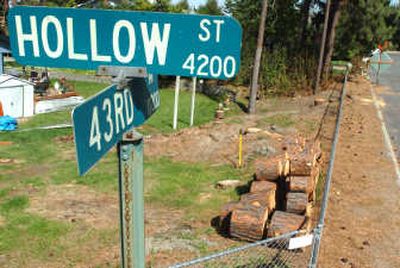Avista fixes leak in area of dying trees

Avista Utilities has repaired a natural gas leak at an intersection in Spokane Valley’s Ponderosa neighborhood where nearly all the ponderosa pine trees are dead or dying.
It’s unclear whether natural gas, which continued to permeate the soil late last week at the intersection of 43rd Avenue and Hollow Street, killed the trees. The forestry program manager for the Spokane County Conservation District found evidence of bark beetle infestation in some dead trees that had been cut into logs and stacked in a yard.
But bark beetles are a parasite of opportunity, typically attacking trees already under stress, and the presence of gas could have been the stressor, said Garth Davis, of the conservation district.
“To be able to make that link with certainty would be impossible,” Davis said. “It may very well have something to do with it.”
Avista spokeswoman Jessie Wuerst said there are claims against the utility related to the Ponderosa gas leak. She said there also have been claims over dead vegetation in the past, but declined to provide details other than to say the claims are being investigated.
Jeremy VanOrman, who lives in a house on one corner of the intersection, said his family has lost nearly 30 trees the past two years. A young maple standing in his front yard was clearly in trouble. The young man pointed to numerous stumps where trees once stood.
“We had to pay to get them taken out,” VanOrman said of the lost trees.
The smell of the odorant that is put in natural gas was evident whenever the family dug a post hole for a fence, he said.
Other neighborhood residents either declined to comment or did not return phone calls.
Avista crews have left numerous holes, about 18 inches long and about as deep, in neighborhood yards to vent gas in the soil.
“The levels are dropping,” Wuerst said. Gas in the soil was in the 0.5 percent to 3 percent range late last week, she said.
A hole about the size of a car has been dug in the center of the intersection to provide access to the leak. The hole has been temporarily covered by the utility rather than filled in and repaved to allow residual gas to escape.
“We are testing daily if not several times a day,” Wuerst said of the gas levels.
The spokeswoman could not comment on the extent or duration of the leak in the 2-inch line, but said it had been fixed after a routine inspection in late July. The area last was inspected in 2004, she said.
Last year, Avista reported to the Washington Utilities and Transportation Commission more than 840 natural gas leaks, down from previous years and “not out of the ordinary,” according to commission spokesman Tim Sweeny.
Such leaks are rarely a safety hazard, but have the “unfortunate effect of killing legacy trees,” Sweeny said. Utilities are aware of this and do aerial surveys of gas transmission lines looking for the telltale sign of a leak – dead vegetation.
Wuerst acknowledged that one way Avista identifies gas leaks is by detecting dead shrubs and grass, “but not mature trees.” It will be left to an expert to decide whether natural gas harmed trees in Ponderosa.
It has long been known that natural gas kills vegetation by displacing oxygen in the soil. A 1977 article in the Journal of Arboriculture cited a 1961 case in which New York City recovered from utilities the cost of trees killed by gas.
Natural gas, which is about 82 percent methane, causes methane-consuming bacteria to multiply, further depleting oxygen and causing a tree’s roots to die.
“A tree is used to 20 (percent) to 21 percent oxygen” in the soil, said Bob Ackley, owner of Gas Safety Inc., in Massachusetts, who has spent more than 30 years working in the natural gas industry. “A gas leak can cause that to go right down to zero. Even 10 percent will weaken a tree.”
Ackley and attorney Jan Schlichtman, who represented Woburn, Mass., families in the famous water contamination case depicted in the book and film “A Civil Action,” have established the Public Shade Tree Trust to help Massachusetts communities recover the cost of trees killed by gas leaks.
Ackley said that since deregulation of the industry, utilities have no interest in fixing low-level leaks that aren’t a hazard until the companies need to replace a gas main.
It’s a bigger problem back east where pipeline joints made for moister manufactured gas have been damaged by drier natural gas.
“Gas systems have obliterated urban forests out here,” Ackley said, “and cities, strapped for money, don’t replant.”
Wuerst, while acknowledging a link between natural gas leaks and dead vegetation, said the utility has the homeowners’ interests in mind.
“We want to work with customers to resolve their claims in the best way possible,” she said.